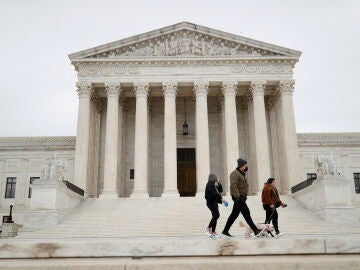
He United States Supreme Court decided this Friday to keep the access to the abortion pill mifepristone, temporarily suspending the restrictions that an appeals court had ordered last week. The decision implies maintaining the “status quo” on the access to medicationat least while the court of appeals decides on the legality of approval that US regulators gave the drug more than 20 years ago.
The court of appeals in question – that of the Fifth Circuit, which includes the states of Texas, Louisiana and Mississippi – approved restrict access to mifepristone while considering a Texas judge’s decision to completely ban access to the pill, which is used in more than half of abortions in the country. The ruling marks the first time that the Supreme Court has ruled on a abortion case following his controversial decision last summer to remove the constitutional protection it had enjoyed since the 1970s, sparking a spate of restrictions in conservative-ruled states.
In a message celebrating the Supreme Court’s decision, the US president, Joe Bidenstressed that “the mifepristone it continues to be available and is approved for safe and effective use while we continue the battle in the courts.” The president assured that his government will continue to defend the approval of mifepristone by regulators, and stated that it will continue to “fight politically motivated attacks on women’s health.”
The highest judicial body in the country decided this Friday block a series of restrictions for the moment that the Fifth Circuit court of appeals had ordered last week, such as prohibiting the pill could be prescribed starting at seven weeks pregnant or his mailing. Two of the most conservative judges on the court, Clarence Thomas and Samuel AlitoThey disagreed with the decision.
Thomas did not explain his reasons for dissenting, but Alito published a separate four-page opinion saying that upholding the Fifth Circuit court’s restrictions would not have made a big difference in access to the drug. Doing so, writes Alito, “would have simply restored the circumstances that existed (and that the government defended) from 2000 to 2016,” which is when regulators decided expand access to the abortion pill.
The ruling returns the case to the appeals court, which has set the date for the start of oral arguments for May 17. At the center of the legal dispute is the health authorization that the Food and Drug Administration (FDA, for its acronym in English) gave mifepristone 23 years ago.
Texas federal judge Matthew Kacsmaryk, nominated by former President Donald Trump (2017-2021), ordered on April 8 to withdraw the health authorization for the abortion pill. The order was appealed by the Government of Joe Biden and the Fifth Circuit Court of Appeals ruled that the drug be available only up to the first seven weeks of pregnancy and that it must be picked up in person, which was initially approved by the FDA in 2000.
The FDA expanded its approval of the drug in 2016 to allow the mifepristone is delivered by mail and can be prescribed by medical professionals who are not doctors, in addition to extending the period in which you can be prescribed at ten weeks pregnant. This extension was invalidated by the appeals court, but the Department of Justice raised the case to the Supreme Court alleging that the restriction would have serious consequences for women and for the pharmaceutical industry, for which the high court has had to intervene.
The Supreme Court decision does not mean that mifepristone can be prescribed in states that have banned abortion, but it does ensures that access to the drug, including by mail, remains as before, at least until the appeal is resolved. The Planned Parenthood organization, which manages the largest network of reproductive health clinics in the country, celebrated Friday’s decision, but warned that women’s health should not be at the mercy of the judicial system.
“We are relieved that access to mifepristone will continue to be protected while this meritless case proceeds. We can take a breather, but without losing vigilance,” the organization’s president said in a statement. Alexis McGill-Johnson. For its part, the main group of conservative lawyers that asked the Supreme Court to maintain the restrictions of the appeals court, the Alliance for the Defense of Freedom, limited itself to recalling that the case must still be resolved in court.
“We look forward to a final resolution of this case that will hold the FDA to account,” attorney Erik Baptist, who belongs to the group, said in a statement. The US vice president, Kamala Harris, who has led the White House’s response to the successive abortion restrictions approved in several conservative states, also celebrated the Supreme Court’s decision, although she defended that “no one should interfere between a woman and her doctor.”
Source: Lasexta
Ricardo is a renowned author and journalist, known for his exceptional writing on top-news stories. He currently works as a writer at the 247 News Agency, where he is known for his ability to deliver breaking news and insightful analysis on the most pressing issues of the day.












